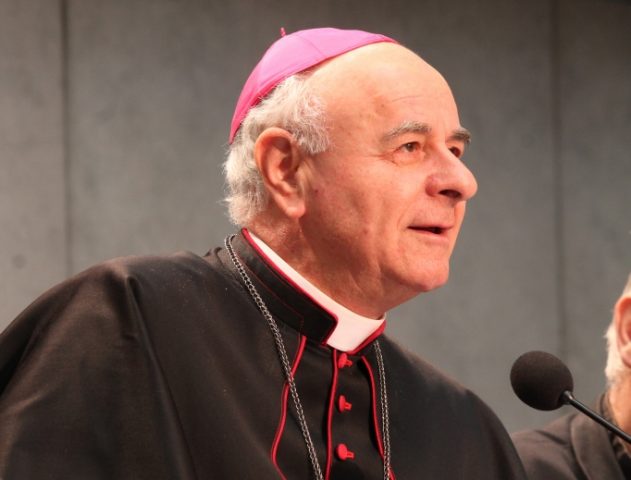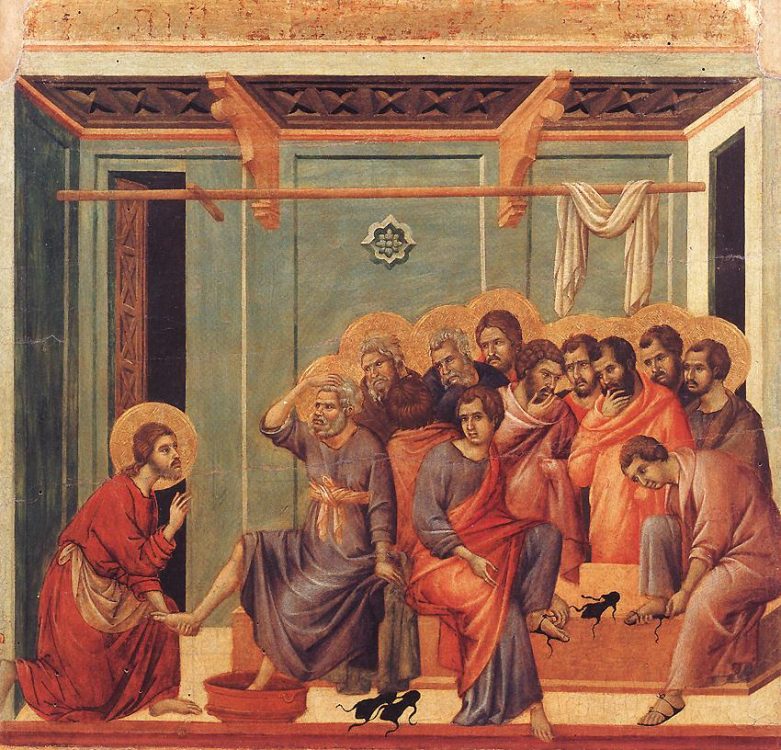LIFENEWS.COM: Texas Gov. Signs Bill Banning Dismemberment Abortions Tearing Babies Limb From Limb
June 7, 2017Pence to Catholics at Prayer Breakfast: ‘This President Stands with You!’
June 7, 2017
A number of issues have been cited regarding the actions of Archbishop Vincenzo Paglia, whom Pope Francis appointed as the academy’s president last November.
By Edward Pentin, EWTN News, 6/6/17
VATICAN CITY — In the nine months since Pope Francis appointed him president of the Pontifical Academy for Life, Archbishop Vincenzo Paglia has made significant but contentious changes to the institution.
The Italian prelate implemented new statutes in November that not only summarily ended the terms of the 172 members of the academy (with some subject to possible renewal), but also removed a requirement for new members to sign a statement promising to defend life in conformity with the Church’s magisterium.
The pontifical academy, founded by Pope St. John Paul II and professor Jerome Lejeune in 1994, is dedicated to promoting the Church’s consistent life ethic and carries out research on bioethics and Catholic moral theology. Over the years it has promoted and developed the Church’s teaching on various areas of medical ethics, including procreation, in vitro fertilization, gene therapy, euthanasia and abortion.
In May 19 comments to the Register, Archbishop Paglia vigorously defended his actions, urging his critics to read what he has said and written in defense of life, marriage and the family, especially his recent talks given in the United States.
He also stressed his appointment was made “in the context of the Holy Father’s general reorganization of the Roman Curia” and that he has had to make logistical adjustments to the academy to cooperate closely with the Curial bodies, particularly the new dicastery for Laity, Family and Life.
But his actions as head of the Pontifical Academy for Life, and before his appointment last year, have caused deep concern among many of its former members.
According to a founding member of the academy, Christine Vollmer, president of the Latin American Alliance for the Family, his actions as academy president amount to the “elimination” of the institution which St. John Paul II in his “great wisdom” set up to “neutralize” the world’s increasing disregard for human life.
Mercedes Wilson, president of Family of the Americas and also a founding member of the academy, said Archbishop Paglia’s appointment is “very tragic,” as both St. John Paul II and professor Lejeune “very carefully and judiciously” chose members “based on their history of loyalty to the teachings of the magisterium of the Catholic Church as well as their pro-life, pro-family historical efforts worldwide.”
“It was originally intended that the academy would be headed by a qualified Catholic layman, not a bishop, archbishop or cardinal,” she said, adding that, although non-Catholics could become members of the academy, they would have to “solemnly declare their fidelity to the teachings of the Catholic Church.”
Removing the declaration of fidelity to the Church’s teaching is “manifestly objectionable,” said Luke Gormally, a former research professor at Ave Maria School of Law and an ordinary member of the academy until last December, adding that he believes it means the academy would no longer have a “useful role” in providing an umbrella for the Catholic pro-life movement, which takes the “Church’s authoritative teaching on contraception as foundational.”
Many see the ending of members’ terms as a purge aimed at precisely replacing them with those who are less rigorously protective of all human life and, according to Vollmer, without the experience of the “struggle ‘on the ground.’”
Previous Problems
But although these changes have taken place under Archbishop Paglia, the academy had problems even before his arrival.
Vollmer said the Secretariat of State had been “increasingly ‘packing’” the academy with individuals who had “little to bring in the way of pro-life knowledge or activity” and said she and others were “dismayed” by limits placed on their discussions.
Gormally said there was “clearly a case for a ‘clear-out,’ but not one motivated by the objectives of the present Pope and Paglia.” Instead, it needed to be “returned to the original Lejeune-John Paul II conception of a lay-led organization outside the framework of the Roman Curia,” he said. The academy, when Cardinal Angelo Sodano was Vatican secretary of state, was rapidly integrated into the Curia and, according to some, became the victim of career moves within it.
For former academy member Dr. Thomas Ward, founder of the U.K.’s National Association of Catholic Families, the current leadership of the academy is “simply another step in the enforcement of a paradigm shift on sexual morality in the Vatican.”
Past members’ criticism of Archbishop Paglia over his apparent direction at the academy is compounded by other incidents that have invited closer scrutiny of the Church leader. They have included, in February, Archbishop Paglia’s praise for Marco Pannella, who founded Italy’s Radical Party and was regarded by many pro-life activists as “Italy’s Margaret Sanger.”
Pannella was instrumental in legalizing abortion in Italy and campaigned for same-sex “marriage” and “transgender rights.”
Sex-Ed Program Criticized
Further issues date back to when Archbishop Paglia was president of the Pontifical Council for the Family, from 2012 to 2016. He had the pontifical council commend a high-school-level sex-education program last year that drew widespread criticism due to its explicit nature.
A third cause of concern involved a mural painted before Pope Benedict XVI brought Archbishop Paglia to the Vatican in 2012, while the Italian prelate was serving the Diocese of Terni-Narni-Amelia. Then-Bishop Paglia, who is depicted in the mural, commissioned the artwork in the city’s cathedral, painted by Argentinian artist, Ricardo Cinalli.
Critics say the enormous work, funded by the diocese and depicting Jesus lifting nets full of prostitutes, homosexuals and others into heaven, is of a homoerotic nature and potentially blasphemous.
As well, Archbishop Paglia has supported the highly contentious “Kasper proposal,” the “penitential path” proposed in February 2014 by German Cardinal Walter Kasper. The proposal, which opened the door to some remarried divorcees living in an objective state of adultery to receiving Communion, led to the controversies surrounding Chapter 8 in the Pope’s apostolic exhortation Amoris Laetitia (The Joy of Love).
In light of all this, Archbishop Paglia’s appointment is “simply outrageous,” said Vollmer. “Catholics will not accept it.” Wilson said his appointment was “inconceivable,” and said his seeming wish to “destroy” both the academy and the Pope St. John Paul II Pontifical Institute on Studies on Marriage and Family, to which he was appointed grand chancellor last year “is a mystery.”
“I personally feel it is embarrassing and feel we should all pray for the Pope and Archbishop Paglia,” she said.
Archbishop Paglia Responds
In his comments to the Register, Archbishop Paglia defended his actions, saying the academy’s new statutes were based on prior proposals to implement term limits that were not in the prior statutes.
“We needed to find a way to reconcile the new limits with the essentially lifelong appointments of existing ordinary members and to deal with other changes in the membership provisions,” he said, adding that they decided “the fairest way to proceed was to have all memberships be subject to the same rules.”
He rejected accusations the members were dismissed, as it “connotes a judgment as to the fitness of a member, which was not the case.”
On the declaration of faith, he urged a closer reading of the statutes, saying the new ones “require a stronger commitment” to pro-life teaching than the previous ones. He said the old regulations contained “only an invitation, not a requirement,” to sign a separate declaration and that the new ones reflect a commitment “every bit as strong” as the academy’s founders had.
The archbishop admitted the sex-education program should have been dealt with “more thoughtfully and professionally” and that, despite being in his 70s, it’s never too late to “live and learn.”
But he defended himself against criticism of the cathedral mural, saying humanity is “shown naked to express its radical poverty” and that he is included in the picture because he needs redemption “no less than anyone else.”
He admitted that, to some, the mural can seem “a too fleshy part” of an evangelizing commitment, but insisted the mural was not intended to be “erotic in any way, including homoerotic,” although he is aware of varying “artistic standards of modesty and appropriateness.” He rejected accusations of it being “blasphemous” and “demonic,” saying such labels were not productive.
Cinalli, whose artistic works one writer described as “Baroque in their emotionalism and Surrealist in their imaginative extravagance,” and which were once used as part of a campaign to legalize same-sex “marriage” in Britain, dismissed accusations that the mural was perverse, telling the Register “only a dirty mind can arrive at that conclusion” and said that it seemed a “medieval position, but we are in the 21st century.”
On the question of his appreciation of Pannella, Archbishop Paglia said he found him to be a man of “great kindness” who “always stood firm for his ideals.” He had an “innate but sadly misguided goodness” that “deserved that measure of praise,” he said, but that did not mean he or the Church condoned the “terrible evils” that Pannella found acceptable.
New Members
Now attention will turn to whom the Pope will choose as new members of the academy. Former members would like them to be people of impeccable credentials and faithful to the magisterium. “They should be members of proven courage that have been defending the teachings of the Church, in particular human life and the family that is under attack as never before,” said Wilson, who also wants more communication with members and greater representation from the developing world.
Gormally said not only should they “happily subscribe” to the Church’s “authoritative moral teaching,” but also be “drawn from the fields of clinical practice, biomedical research, social research, law, philosophy and theology — to provide the required combination of relevant expertise in addressing bioethical issues.”
Ward said they should be “absolutists with proven track records of active defense of all innocent human life” and be “quite specific” in their support of Humanae Vitae. Overall, those questioned by the Register would prefer the academy be led by a layperson, as the founders originally intended.
For former members of the academy such as Ward, the academy is victim to a worldly spirit at a time when its work is most needed.
“Millions of Catholic parents and our 5,000 bishops must look in the eye the evil that has infiltrated the Church at the highest levels,” he said. “They have to wake up to what is going on: It’s a moral nuclear wasteland.”
Archbishop Paglia sought to reassure that new members will be “not only talented and accomplished,” but also “truly representative of all who value life at all its stages.”
He said his vision for the academy is one that must “express clearly what it means to be human and must present an attractive vision of human love and solidarity,” drawing on the Church’s “great treasury of human and Gospel wisdom” to inspire all cultures “to a new and fruitful humanism.”
PHOTO: Archbishop Vincenzo Paglia, current president of the Pontifical Academy for Life, speaks about the 2015 World Meeting of Families during a press conference at the Vatican Press Office March 25, 2014.
Edward Pentin is the Register’s Rome correspondent.







